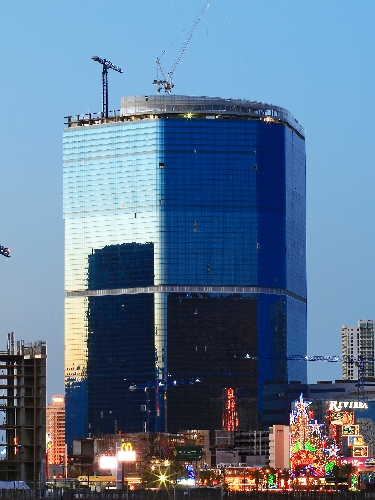Justices weigh idled Fontainebleau project
Contractors claiming they are owed more than $350 million on Las Vegas's defunct Fontainebleau resort went Tuesday to the Nevada Supreme Court in their battle to be paid something for their work.
In oral arguments before six justices, the contractors contended that they're being penalized for mistakes made by major banks that provided construction financing in 2007. Under Nevada law, argued contractors' attorney Gregory Garman, their mechanics liens should stand higher on the repayment ladder than the bank loans.
"What (the banks) are attempting to do is shift a poor business decision in hindsight to the contractors," he said. "This is a windfall for the banks."
More than 100 contractors, many based in Las Vegas, have filed more than 325 claims in the Fontainebleau's bankruptcy case, although a review of their accuracy has not yet been conducted. If the Supreme Court rules against them, they probably will receive nothing because the banks could claim the entire $100 million available for distribution to creditors. A win, on the other hand, could net them checks worth about 30 cents on the dollar, although the calculation remains rough.
The consortium of lenders who poured nearly $2 billion into the Fontainebleau before shutting off the money spigot three years ago countered that they were merely following well-established Nevada law. A legal doctrine called equitable subrogation allows a lender that refinances a property to take over all the legal rights of the original lender, including the top repayment priority.
"There are no special exemptions for mechanics liens or any other competing interests," said attorney Rew Goodenow for Wilmington Trust FSB, the administrative agent for the lenders.
The Fontainebleau bankruptcy is being litigated in Miami. But because of the ambiguity in Nevada law about repayment priorities, a Florida judge sent the issue to Nevada's highest court for resolution. The potentially far-reaching consequences of the ruling spurred other groups, such as the Associated General Contractors and the Nevada Bankers Association, to have their attorneys weigh in.
Lenders contend that if subrogation is curtailed, interest rates could go up and loan qualification standards could be drawn tighter.
"Lenders would have to re-evaluate what they would do in refinancing situations," Goodenow said after the hearing. "And what Nevada needs right now is refinancing."
The Nevada Land Title Association has predicted that title insurance prices would spike, driving up interest rates or causing lenders to stop making loans at all.
But the battered construction industry countered that downgrading mechanics liens would expose contractors to even more risk and losses on the credit, labor and materials they provide to developers.
With the Fontainebleau, the original $150 million loan to buy the nearly 24.5 acres next to the Riviera and pay for initial work was refinanced in June 2007. The banks contend that the refinancing put them in the same legal position as the original loan because of subrogation. The contractors say improvements commenced prior to the refinancing, so Nevada law puts them ahead of the banks.
Garman outlined several steps the banks could have taken to keep themselves first in the repayment line, such as erecting a chain link fence around the site prior to refinancing, but did not.
In an odd symmetry in the Fontainebleau's existence, New York financier Carl Icahn bought the property and unfinished building out of bankruptcy two years ago for $156 million, almost exactly the same amount as the original loan.
The 68-story Fontainebleau remains an unfinished hulk on the north end of the Strip.
Contact reporter Tim O'Reiley at toreiley@review
journal.com or 702-387-5290.




























